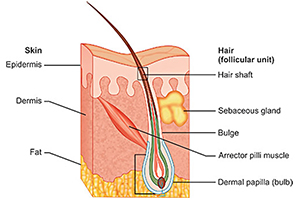Female Hair Loss Treatment
Hair loss is a widespread concern that transcends gender boundaries. Although commonly associated with men, this issue affects countless women across various demographics. Nearly 40 percent of women are thought to experience some type of hair loss in their lives, either temporary or permanent, and it can have a devastating effect on their well-being and quality of life. At Leonard Hair Transplant Associates, our extensively trained hair restoration surgeons, Dr. Matthew Lopresti and Dr. Mary Lopresti, are committed to helping women treat this distressing problem. Through a combination of cutting-edge surgical and non-surgical techniques, our goal is to halt the progression of hair loss and rejuvenate your natural hair.
If you’re experiencing hair loss, we can help. Don’t let this common condition prevent you from enjoying your life to the fullest. Contact us today to learn more.
- What Is Female Hair Loss?
- Causes of Female Hair Loss
- Female Pattern Hair Loss Symptoms
- What to Do if You Notice Female Hair Loss
- Female Pattern Hair Loss Treatments
- Preventing Female Hair Loss
- Age That Hair Starts Thinning in Women
What Is Female Pattern Hair Loss?
Female pattern hair loss, medically referred to as androgenetic alopecia, can occur at any age. It is by far the most common cause of hair loss in women. Similar to male pattern baldness, it is mostly a genetic condition. If you look back at the women and men in previous generations in your family, you will very often see hair loss. Although due to the same underlying factor as male pattern baldness, female pattern hair loss typically occurs differently from what many men experience. The hair loss often begins as thinning hair on the top and sides of the scalp, although sometimes the back of the head may also be affected. Hair loss often will continue unless treated. Without intervention, this pattern of hair loss tends to persist over time.
Hair loss can be a hereditary characteristic passed down from either side of the family. Hair loss in recent generations often occurs earlier in life than that of the mothers, aunts, or grandmothers in your family tree. We don’t know exactly why, but it is quite commonly observed. Also, even if you don’t know of anyone with hair loss in your family, this condition may have occurred in prior generations of women who are no longer known to your living relatives.
More ReviewsDrs. Leonard and Lopresti are incredibly talented, friendly and warm. They make each patient feel welcome and comfortable in what can be a stressful situation. As a cosmetics patient, I find the experience to be nothing but positive and now have family members who come for hair-loss treatment. Cannot say enough good things about this practice!
Lisa Doucet-Albert
September 21, 2018
What Causes Female Hair Loss?
 Some women experience medical (non-hereditary) causes of hair loss that must be investigated. In these situations, Our skilled team of hair restoration specialists collaborates closely with your family physician or endocrinologist to pinpoint the underlying cause and develop a tailored treatment plan.
Some women experience medical (non-hereditary) causes of hair loss that must be investigated. In these situations, Our skilled team of hair restoration specialists collaborates closely with your family physician or endocrinologist to pinpoint the underlying cause and develop a tailored treatment plan.
Some of the factors that can cause hair loss in women other than androgenetic alopecia include hormone fluctuations, pregnancy, menopause, thyroid conditions, vitamin and mineral deficiencies, going on or off birth control pills, and skin conditions. Additionally, certain hairstyles (braids, tight ponytails), chemical hair treatments, and styling tools can damage hair and lead to temporary or permanent hair loss in women.
At What Age Does Hair Start to Thin in Women?
Hair thinning in women can begin at various stages of life. While it can start as early as the late 20s or early 30s, androgenetic alopecia, or female pattern hair loss, typically becomes more noticeable once women reach their 40s and 50s. This common type of hair loss may present subtle initial signs such as increased hair shedding, wider parts, and visible scalp.
Recognizing these early symptoms and seeking guidance from specialists like Dr. Matthew Lopresti is important for preventing further hair loss and getting the best possible result from any potential treatments. Our team offers personalized solutions to effectively manage and treat hair thinning, supporting women at any age in their journey to restore fuller, healthier hair.
What Are Common Female Pattern Hair Loss Symptoms?
Female pattern hair loss can present differently than male pattern hair loss. You may notice gradual thinning all over the scalp or in certain areas, or you may simply notice more hair in your brush or in the shower drain. Some of the signs of hair loss can include:
- Gradual Thinning: Thinning of hair on the top of the scalp is a typical early sign of female pattern hair loss. This thinning may start around the part line and gradually spread outward.
- Widening Part: As hair begins to thin, the part in the hair may appear wider than before.
- Increased Hair Shedding: While it’s normal to shed some, around 100 hairs daily, if you notice an increase in the amount of hair you’re shedding, it could be a sign of female pattern hair loss.
- Miniaturization of Hair: Hair follicles affected by female pattern hair loss may produce thinner, finer hairs, known as miniaturization. Over time, these hairs may stop growing altogether.
- Reduced Hair Density: The overall density of hair on the scalp may decrease, leading to a less voluminous appearance.
- Receding Hairline: While less common in women than in men, some women with female pattern hair loss may experience a receding hairline or thinning at the temples.
- Visible Scalp: As hair thins, the scalp may become more visible, especially in areas where hair loss is most pronounced.
Most types of hair loss indicate female pattern hair loss while other types may be caused by a medical issue. We will work with you to identify the underlying issue and assist you in finding a treatment that helps halt hair loss and restores your hair.
What to Do if You Notice Signs of Female Hair Loss
 The most important things to remember are: Do not ignore your hair loss; do not dismiss it because you hope it will get better on its own; and do not try to rationalize that it is a side effect of your shampoo, hair coloring, or daily routine.
The most important things to remember are: Do not ignore your hair loss; do not dismiss it because you hope it will get better on its own; and do not try to rationalize that it is a side effect of your shampoo, hair coloring, or daily routine.
Unfortunately, this is exactly what happens with many women because they are simply given bad advice. Many of our patients first approach a physician with their concerns. But, oftentimes, that doctor dismisses their hair loss concerns. They’re told it is “normal,” that “there’s nothing that can be done,” and to “get on with your life.” However, in many, many cases, something can be done. There are numerous options available to help treat hair loss, stimulate regrowth, and restore the hair with beautiful results.
Most physicians are not trained to recognize and treat hair loss. While they may be able to cure a variety of illnesses, they oftentimes fail to understand that hair is an integral piece of our individual identity. For many women, losing your hair means losing who you are. The good news is, we can help.
What Are My Female Pattern Hair Loss Treatments?
If you suspect you are losing your hair, seek out the opinion of a leading hair restoration surgeon like those at Leonard Hair Transplant Associates. We’ve helped women with their hair loss for more than 30 years. We’ll work together to stabilize your hair loss, and then develop a treatment plan for restoration.
Presently, there are several wonderful and effective surgical and non-surgical treatments for female pattern hair loss that we offer to our patients:
- Platelet Rich Plasma with ACell® Injection Therapy – A revolutionary treatment that helps stimulate the activity of hair follicles without surgery using your own blood and growth factors.
- Auxo A300™ is a non-surgical treatment that uses low level laser light energy to potentially stabilize hair loss.
- ROGAINE® not only stabilizes hair loss in most women, but it actually can stimulate new hair growth.
- Propecia® is another medical treatment. While it is not FDA-approved for women, it can be very effective in certain circumstances. It may be considered in specific situations.
- Hair Transplant Surgery can provide significant improvement for female balding. Hair is harvested from a donor site and transplanted to the area of concern, where it should continue to grow.
Many times at our practice we will combine some of the above approaches to help patients achieve the fullest, most natural result possible. The bottom line is that we will work together to help you to begin to feel like your old self again.
How Can I Prevent Female Hair Loss?
While we cannot overcome our genetics, it is possible to reduce the risk of developing hair loss from other causes. Some preventive tips you can use to preserve your hair include eating a healthy diet to provide your body with the nutrients it needs to keep hair strong and growing. Other advice includes:
- Avoid tight hairstyles as tight ponytails, braids, or buns can lead to traction alopecia, a type of hair loss. Try not to compulsively twist, rub, or pull your hair.
- Choose shampoos, conditioners, and styling products that are gentle and suitable for your hair type. Avoid products containing harsh chemicals like sulfates and parabens. Avoid harsh treatments like perms, chemical straightening, and excessive brushing or combing, especially when your hair is wet.
- Protect your scalp from sunburn by wearing a hat or using a sunscreen specifically formulated for the scalp, especially if you have thinning hair.
If you have any questions about how to reduce the chance of hair thinning and loss, our physicians will be happy to provide advice and additional tips to assist you.
We understand you may have questions. Our friendly and knowledgeable team can provide additional information or help you to schedule a complimentary consultation. Simply contact our practice today.

